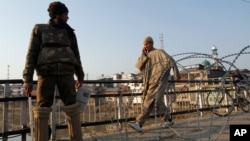NEW DELHI —
Authorities have imposed a curfew in Indian-Kashmir, after a man convicted in the 2001 attack on India's parliament was executed in a New Delhi jail.
Afzal Guru was hanged at 8 a.m. local time in the Tihar prison, after President Pranab Mukherjee rejected his plea for clemency earlier this week.
Guru had denied involvement in the 2001 attack, during which five gunmen stormed parliament - shooting and killing nine people - mostly security forces. The assailants were killed before they could enter lawmakers’ chambers.
The Indian government blamed the attack on the Pakistan-based militant group Jaish-e-Mohammad and accused Guru of conspiring and sheltering the militants who attacked parliament. He was convicted and sentenced to death in 2002.
Following Saturday’s execution, clashes broke out in Guru’s native Kashmir despite a curfew imposed in the disputed Himalayan region. Indian-Kashmir’s Chief Minister Omar Abdullah appealed for calm.
He says, "there are some who would like to exploit the hanging of Afzal Guru to try and incite violence." He hopes that Kashmiris will exercise restraint and not allow themselves to be influenced in such a way.
In New Delhi, the ruling coalition led by the Congress Party rejected criticism from the main opposition-Bharatiya Janata Party who questioned the decision to carry out the death sentence after more than a decade.
“On internal security, the UPA government has never shied away from taking decisions which are tough, which are in [the] national interest, which further the cause of national security and whenever we take decisions of national security, we do not keep electoral considerations in mind," said Manish Tewari, India’s information and broadcasting minister.
Guru’s execution comes just three months after Ajmal Kasab, the lone surviving gunman convicted in the 2008 terrorist attack on the country’s financial hub, Mumbai, was hanged in the same New Delhi prison.
Prior to Kasab’s execution in November 2012, India had imposed an unofficial moratorium on executions for eight years.
"This is the second hanging and it is really a distressing step back, Human Rights Watch believes that the death penalty should be abolished because it is an inhumane and irreversible process,” said Meenakshi Ganguly, South Asia director for Human Rights Watch.
Human Rights groups had alleged the 43-year-old Guru was not given immediate legal representation and thus denied a fair trial.
In Kashmir, Muslim separatist leaders have called for a three-day shutdown to protest Saturday’s execution. The region is divided between India and Pakistan and claimed in full by both. Separatists have been fighting for independence from India or a merger with Muslim-majority Pakistan.
Afzal Guru was hanged at 8 a.m. local time in the Tihar prison, after President Pranab Mukherjee rejected his plea for clemency earlier this week.
Guru had denied involvement in the 2001 attack, during which five gunmen stormed parliament - shooting and killing nine people - mostly security forces. The assailants were killed before they could enter lawmakers’ chambers.
The Indian government blamed the attack on the Pakistan-based militant group Jaish-e-Mohammad and accused Guru of conspiring and sheltering the militants who attacked parliament. He was convicted and sentenced to death in 2002.
Following Saturday’s execution, clashes broke out in Guru’s native Kashmir despite a curfew imposed in the disputed Himalayan region. Indian-Kashmir’s Chief Minister Omar Abdullah appealed for calm.
He says, "there are some who would like to exploit the hanging of Afzal Guru to try and incite violence." He hopes that Kashmiris will exercise restraint and not allow themselves to be influenced in such a way.
In New Delhi, the ruling coalition led by the Congress Party rejected criticism from the main opposition-Bharatiya Janata Party who questioned the decision to carry out the death sentence after more than a decade.
“On internal security, the UPA government has never shied away from taking decisions which are tough, which are in [the] national interest, which further the cause of national security and whenever we take decisions of national security, we do not keep electoral considerations in mind," said Manish Tewari, India’s information and broadcasting minister.
Guru’s execution comes just three months after Ajmal Kasab, the lone surviving gunman convicted in the 2008 terrorist attack on the country’s financial hub, Mumbai, was hanged in the same New Delhi prison.
Prior to Kasab’s execution in November 2012, India had imposed an unofficial moratorium on executions for eight years.
"This is the second hanging and it is really a distressing step back, Human Rights Watch believes that the death penalty should be abolished because it is an inhumane and irreversible process,” said Meenakshi Ganguly, South Asia director for Human Rights Watch.
Human Rights groups had alleged the 43-year-old Guru was not given immediate legal representation and thus denied a fair trial.
In Kashmir, Muslim separatist leaders have called for a three-day shutdown to protest Saturday’s execution. The region is divided between India and Pakistan and claimed in full by both. Separatists have been fighting for independence from India or a merger with Muslim-majority Pakistan.




